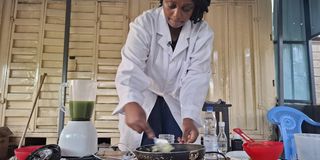Nakuru's Faith Wandia creates sanitary towels from grass

Faith Wandia in her makeshift lab during an interview on November 3, 2024.
Period poverty remains a major threat to the education of girls in low income settlements in Nakuru’s urban and rural areas.
According to a 2016 data by the Ministry of Health, 54 percent of girls in Kenya face challenges in accessing menstrual management products, with 65 per cent still lacking sustainable access to safe menstrual products.
Faith Wandia, is a woman on a mission to help reduce these numbers to zero.
Wandia is now spearheading the innovation of making sanitary towels from grass, which she says was sparked by a lack of affordable and sustainable sanitary material, for over millions of girls and women in the country.

Faith Wandia holds out the prototype sanitary towel mase from grass during an interview on November 3, 2024.
“I use grass to make the sanitary towels, which are comfortable and have a high absorbency rate because it is sustainable in that is biodegradable, grows abundantly, renews quickly and decomposes faster than conventional pads,” says the Founder and CEO of Wandia Innovations Company Limited.
In the process, Wandia first boils the grass to make it soft, cuts, blends and sieves it as she adds other compounds to make what is referred to the inner core of the towel, which helps with absorption.
“From the research we have conducted, we have found that grass is gentle on skin hence, when making our sanitary towels, we are not adding other chemicals in the whole process as this is less likely to irritate compared to conventional pads,” says the innovator.
For the outer core, she mixes grass and other compounds to make the bioplastic made from grass pulp, and notes that this whole process is to ensure that they decompose faster than conventional pads.
Additionally, she is not selective on the grass used and adds that all kinds of grass could work.
We ask the innovator why grass, seeing that in 2022, she came up with ugali made from grass in a bid to fight and reduce hunger.
“Many people see grass as another part of the flora and fauna in our environment, but for me grass is an innovation waiting to happen,” says Wandia.
26-year-old Masters in Finance graduate adds that she is exploring how she can harness this underappreciated resource to develop innovative solutions that not only benefits us but also nurtures our planet.
With the rising cost of sanitary towels, Wandia says her innovation is set to fill the gap in lack of affordable sanitary material for millions of girls and women.
Mtaa Wangu conducted a recon visit in several retail stores within the CBD and established that sanitary towels range between Sh. 50 to Sh. 300 which might not be affordable to many girls in low income communities.

Faith Wandia showcases the absorbent inner core of the sanitary towel made from grass pulp, during an interview on November 3, 2024.
While Wandia is a think-tank for innovations, she notes her greatest challenge has been to acquire funds. Most of the funds she uses have been out of pocket, which has been strenuous for her.
“Many funders require innovators to have traction and have been in operation for quite a while, which has affected my ability to get funds, but I am hopeful in the future, these requirements will easy down.
For now, I will not allow this to keep me down and will keep striving and find more solutions to problems,” says Wandia.
Now, she is working with a local university to fine-tune her prototypes into a final product as she hopes to get a certification of standard from KEBS.
